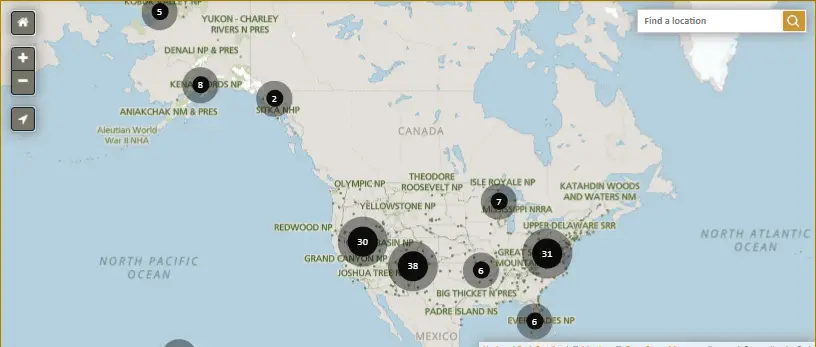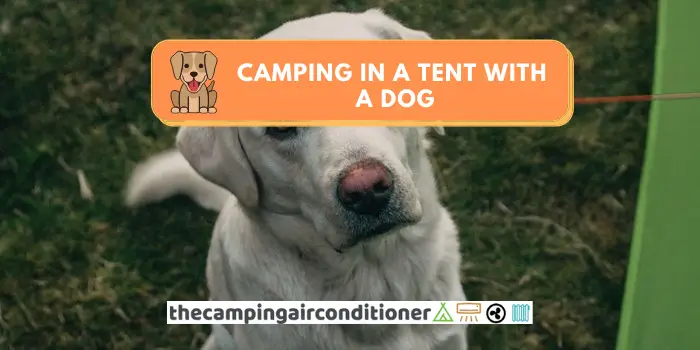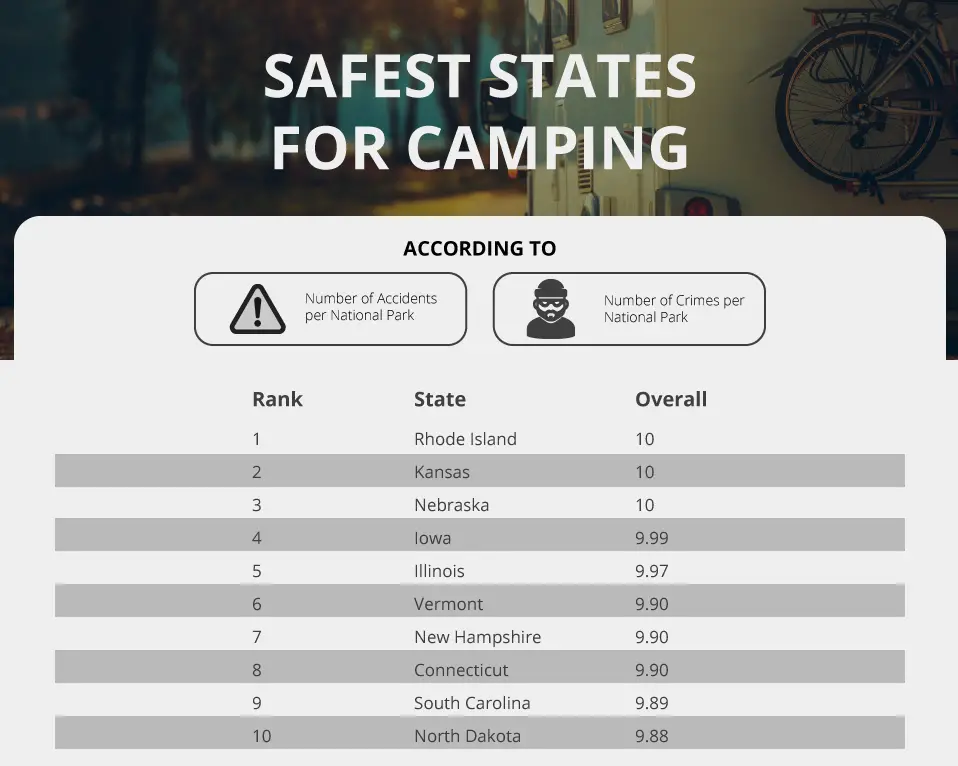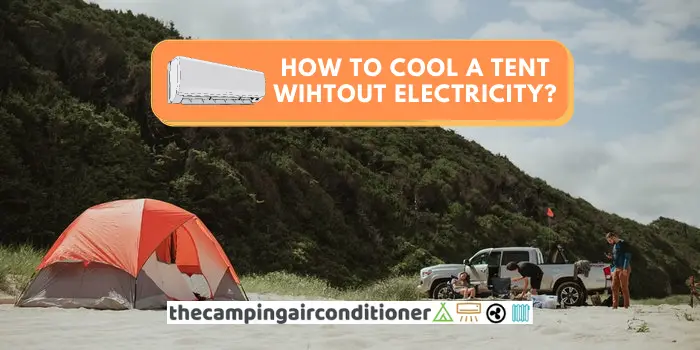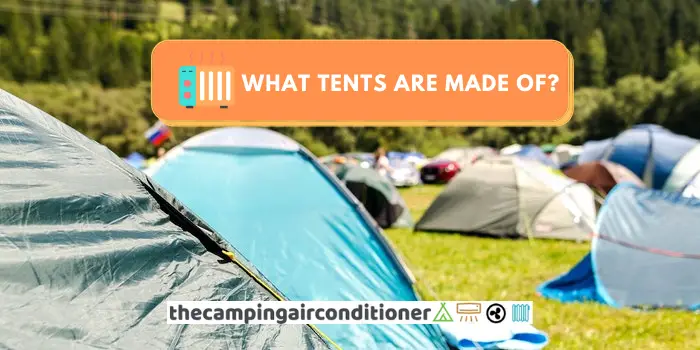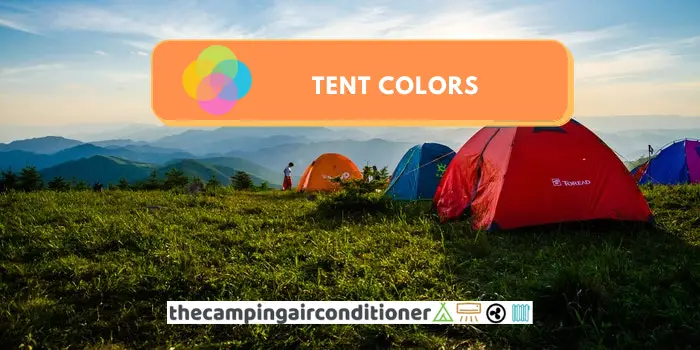The Camping Air Conditioner is sponsored by readers. When you buy through one of our links, we may earn an affiliate commission at no extra cost to you that will help us to create useful and independent content.
When it comes to camping, comfort and security are the most important things. So, what can you do to ensure you are safe and comfortable during your trips? This post details how to lock your tent at night and tent security tips.
Keeping your tent locked is an easy way to keep your valuables safe. Although someone can access your tent by tearing the sides, having a lock is a reasonable precaution that can scare away a potential thief.
Other than using a tent lock, ensure you keep valuables out of sight, camp in a safe area, go camping in groups, and many more. If you want to know more about how to lock your tent, check our guide below.
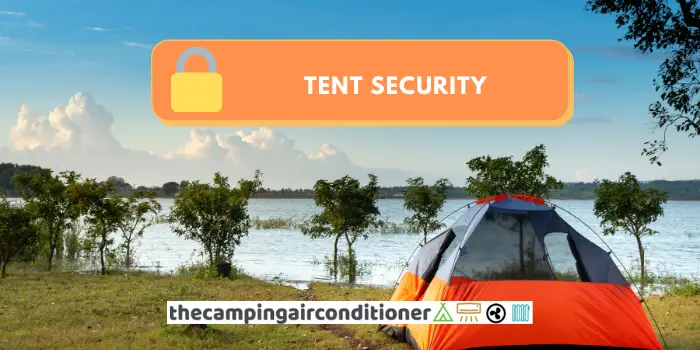
Tent security
This section will discuss the easiest ways to ensure your tent security. These tips will help you feel secure and comfortable no matter where you are camping.
Tip 1 - Use a Tent Lock
A tent lock is a safety device attached to the tent’s zipper to secure the tent. An intruder can access your tent by slashing the walls. However, as with typical security measures at your home, any intruder will be looking for easy access. They leave for an easy target if they find a hint of resistance. So, having a tent lock can keep your tent secure.
Generally, tent locks have a combination, meaning you can set a passcode that only you, your family, or your friend know. It would take a burglar time to try and crack the combination on the lock or dismantle the whole lock. Tent locks are good at protecting the tent interior while you are gone or at night.
Furthermore, it is also important to note that determined burglars can find a way of dealing with tent locks, so never expect a tent lock to secure every aspect of your tent. However, it is an effective way to protect your tent at night.
Tip 2 - Use a campground
A campground is the most secure and comfortable place to camp. A campground has many people walking around, and it is always safer to leave your things comfortably. There are many eyes and ears, making it unfavourable for thieves or intruders to break into a tent when there are people around.
Recommended: Most scenic campgrounds in the US (article)
However, even if you are camping in a campground, you still must be careful. Sometimes, it can be tricky to notice someone walking past your campground in a crowded campground. So, avoid leaving valuables out in the open such that a thief can grab and go.
It is good to camp in campgrounds with gated access to add more security. No one can enter without access in a gated campground without permission, making it hard for someone to break into your tent.
Also, know that not all campgrounds are created equal. If a campground is not well maintained, it might not be the safest option. On the other hand, if it looks clean and well kept, chances of it being secure are high.
There picture below was extracted from National Park Services and lists hundreds of campgrounds available in the USA. If you want to check all of them, click here.
Tip 3 - Choose a safe campsite
A campground is the most secure and comfortable place to camp. A campground has many people walking around, and it is always safer to leave your things comfortably. There are many eyes and ears, making it unfavourable for thieves or intruders to break into a tent when there are people around.
A campground out of the way will generally be more secure than a campsite along a busy trail or road. Locations where someone can walk through, grab something and keep going, can be less comfortable and safe than a location with one way in and out. If possible, try camping in areas with security guards and security access, such as gates.
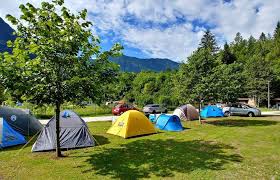
If you like true wilderness camping in isolation, avoid travelling far from the beaten path. We also advise you to pick a tent with shiny colors to facilitate spot and identification in an emergency.
Avoid choosing a spot covered with trees, vegetation, or ground cover when there is an option. It would be hard to see any burglar coming or going, and a potential thief will feel comfortable if you are not seeing them. The most secure campsite is a location where other campers are near you. If they hear something going on, they will alert or protect your tent.
Simple measures that can help you on choosing a safe campsite:
a) Look for campsite reviews on the internet – they might point out any potential security problems (tripdvisor.com has numerous reviews)
b) Check whether the camp has security devices, such as cameras, gates, 24/7 guards, good illumination, and others.
Tip 4 - Get acquainted with other campers and Park Rangers
Upon arrival, introduce yourself to your neighbours and, if possible, to park rangers. Campers tend to be friendly and open. A simple conversation can help you to connect with other people and create a bond that can help to improve your security sensation and community feeling
If your campsite has a park ranger, make sure that you introduce yourself to them. They might give you helpful local tips regarding security, ways to enjoy the park, and potential risks. Always double-check site regulations and restrictions and make sure that you are comfortable with them.
It is a good idea to see whether there are any emergency procedures that you should be aware of.
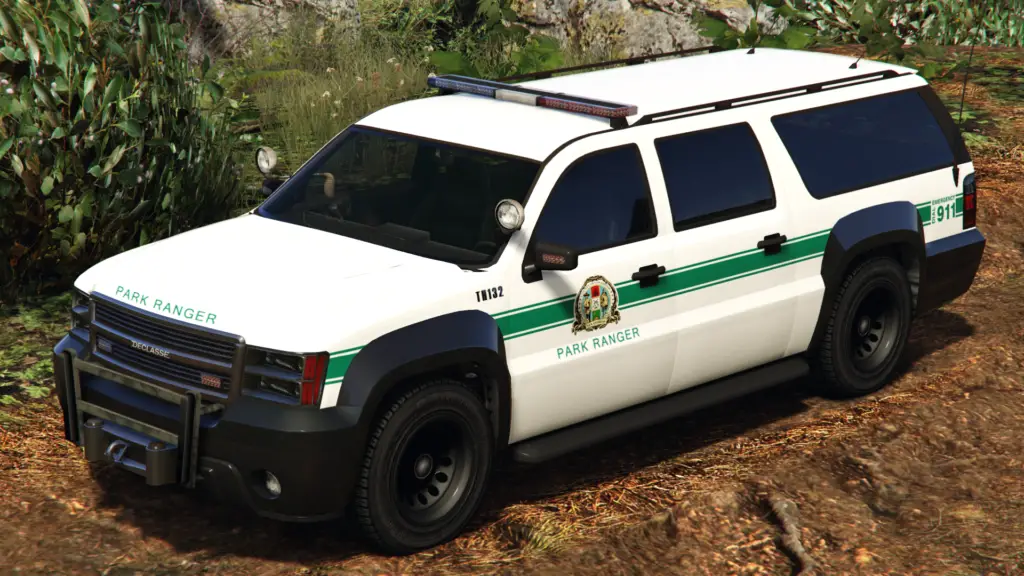
Tip 5 - If camping in a remote location, camp with others
The other practical way to secure your tent is camping with people you trust and know. Having friends around you is suitable for campers who love camping in remote areas. Try to establish “shifts” for hiking and walking so that you never leave your tents alone.
When your campsite is isolated from others, your camp will make an easy target. Thieves will avoid a campsite filled with people and concentrate on areas with the least resistance.
Tip 6 - Secure your valuable items.
It is important not to carry many valuables during your camping trip. Make sure that you only take to your trip what is required. For example, you probably do not need to bring your tent air conditioner during winter camping.
If you must have them, store them anywhere else secure other than your instant tent. For instance, you should leave your valuables locked in a car or keep them in a secure box inside the tent if a vehicle is unavailable.
A thief will expect your valuables to be in the tent and not in the vehicle.
Moreover, you have to keep the valuables out of sight. Keeping items in view and not covering locks will alarm a thief that you have something of value you are protecting. For a fact, no one can try to steal from you if they think you have nothing of value.
Tip 7 - Keep your camping spot illuminated
Always leave your camping area with plenty of light. Having a limited view during the night is a safety issue for theft, trip hazards, and the presence of wild animals. Potential intruders might feel more confident with darker environments and prone to take more risks.
An illuminated area will improve your safety in your camping ground and avoid other hazards. We recommend using LED lights, because of their power and low energy consumption.
Tip 8 - Bring your dog with you
Apart from having the company of your best friend and lots of fun when playing with them, they might increase the campsite’s safety. Dogs are known for their ability to protect environments and warn you of potential invaders and unexpected movements in the surrounding areas of your tent.
Read our detailed guide on how to camp with your dog.
Tip 9 - If camping with a Recreational Vehicle (RV), have an insurance policy in place.
You probably already have an insurance policy in place for your RV. However, have you checked whether it covers third-party liability, fire and theft claims? If not, it might be worth going through it or checking it with your broker.
Overall, the higher the coverage, the more expensive the insurance premium. But we believe that it is worth it, especially when you are camping with your caravan.
Tip 10 - Practice Self Defence in case of an emergency
Camping outdoors comes with many surprises, and you should be prepared. Depending on where you are camping, it is good to defend yourself from local wildlife. Having self-defence skills will give you a better sense of security at night.
Also, some skills can help defend yourself from intruders or thieves who come to scare you.
FAQ
Is camping alone safe?
All you need is safety and comfort when camping by yourself. Before you head out, leave someone with your camping plan so that they can know how to reach you in case something goes wrong.
Camp in an area you are comfortable with or in a campground and choose a shiny tent color to help identify and spot in an emergency. Check reviews on the internet for your chosen camping location and avoid any place with bad reviews.
How to choose a safe campsite?
A couple of simple steps might help you on choosing a safe campsite, such as:
- Do a quick review on social media about the campground. You probably will find post reviews to help you on your research
- Prioritise locations with security initiatives (camps that required identification and registration, security gates, presence of security guards, security cameras, good lighting system, etc.)
- Check with park ranges and friends about security issues at your chosen campground.
What are the safest States to camp in the US?
Insuremytrip.com published in 2021 a list of the safest States to camp in the USA. Rhode Island, Kansas, and Nebraska appear as safest options, with almost non-existent crimes. On the other hand, Wyoming was the worst performer.
How do you ensure your campsite is secure?
The best way to secure a campsite is by making sure it looks like campers are always there. Convince someone you will be back at any second. This way, you will scare away thieves and intruders.
For example, avoid leaving valuables at the campsite when not around. If you use a lock, don’t leave it exposed because this will alert thieves you have valuable in the tent. If you don’t have a vehicle to hide valuables, then hide it completely.
Do tents have locks?
Yes, tents have locks, although in many cases, you must purchase the lock. Having a tent lock makes you feel comfortable and secure when camping. A tent lock makes it hard for outsiders to access your tent at night.
Whichever way you choose, avoid showing that you are using a tent lock because this may send a signal that you have valuables in your tent. During the daytime, cover the tent lock so it can’t be seen
Which is the best way to keep your tent safe while camping?
Ensure you camp on a safe campsite. Don’t camp in an area you feel uncomfortable because you won’t have the best camping experience.
To keep the tent and your valuables safe, don’t camp in an unsecured campground or right of a busy trail with lots of people passing.
Get to know other campers and introduce yourself to park rangers. They might help you with local security tips.
Set your tent on an out-of-the-way dead end where no one would expect to find a campsite. Intruders or thieves can’t steal what they don’t see.
Prefer camps with security devices and measures, such as gates, check-in and identification measures, security cameras, and others. In a secure campground, everyone watches out for each other.
Where can I find a detailed list of all campgrounds in the US?
The National Park Services offers a detailed list of all campgrounds available in the US. There are hundreds of options across multiple states.
What are the most dangerous national parks in US?
Forbes.com has published a detailed study around the most dangerous national parks in the United States. he table below summarises their findings. We note that the ranking includes crimes and accidents, such as car crashes, drownings, wildlife, etc.
The most dangerous parks are:
a) Grand Canyon Park (Arizona)
b) Yosemite National Park (California)
c) Great Smoky Mountains National Park (North Carolina / Tennessee)
Are there insurance policies for camping?
Yes, there are multiple options these days, such as hicamp.com. You can find the detailed policy in their website and check if its coverage.
What is the cost of a RV insurance?
This will depend on a wide variety of variable, such as your RV model, level of insurance, premiums, and your background. Money.com offers a good review with regards these insurance products.
How do you protect your food from animals while camping?
Bears, raccoons, hedgehogs, and other animals can easily tear into your tent. Even though a lock is essential for security, it can be useless for keeping animals out.
To prevent animals from tearing into your tent, avoid storing food in your tent during the day or at night. You should keep the food in your vehicle. If you don’t have a vehicle, secure the food properly and use a rope to hang it off the ground where animals can’t reach it.
Can I bring my dog to a campsite?
You should check whether the campground that you are going to allows pets. Check their regulations and phone them in case of any doubts.
Conclusion
We hope you have learned more about tent security from the above guide. Still, a peaceful outdoor adventure like camping requires careful planning before heading out.
Our guide’s measures are easy to follow to ensure your tent is safe. Buying a tent lock is a safety precaution that will reduce the chances of someone accessing it at night or when away.
Apart from that, always do previous research about the area that you are planning to camp. Bringing your dog might be a great idea as well. The canines are known for their loyalty, ability to protect environemnts and happiness.
Overall, these safety tips will help you feel secure and comfortable.

